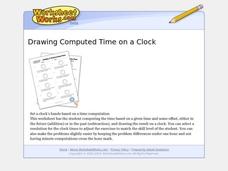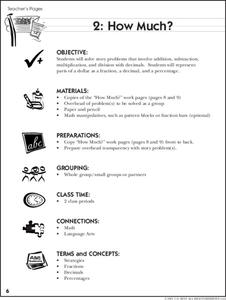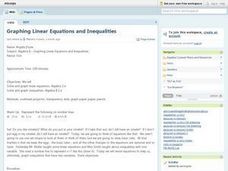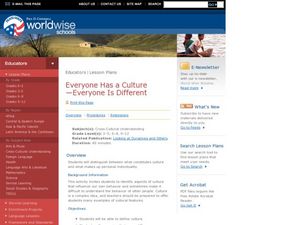Will Steger Foundation
The Carbon Cycle - What are its Implications for Climate Policy?
The carbon cycle isn't a bike which produces carbon and this instructional activity explains why. Through reading and discussion, groups of pupils create visual explanations of the four parts of the carbon dioxide oxygen cycle....
Curated OER
Drawing Computed Time On A Clock
In this drawing computed time on a clock worksheet, students explore and analyze how to set a clock's hands based on a time computation. Students either offset the time for the future (addition) or in the past (subtraction).
Curated OER
Polynomials
Students add and subtract polynomials. In this polynomials assessment, students calculate ten questions using addition and subtraction. Students use Lego manipulatives to create their own worksheet on polynomials.
Teach Engineering
Design Step 5: Construct a Prototype
Enough with the talking, let's build something! In the fifth step in the engineering design process, young engineers build a prototype to test their ideas. The lesson walks them through the process of evaluating it step-by-step....
Science 4 Inquiry
Let's Get Moving
Rivers top the list of causes of erosion over time. Scholars experiment with wind, water, and ice reshaping sand. They connect the simulations facts about erosion and deposition to understand unique landforms such as the Grand Canyon and...
Curated OER
Isoseismal Maps
Students examine the difference between magnitude and intensity in earthquakes. They complete map work and write a first hand account of a person living in each level of intensity on the Modified Mercalli Scale.
Curated OER
Extreme Elevations
Seventh graders use highest and lowest points of land elevation around the world to find the differences. Sea level is zero, so students be operating with positive and negative numbers. After students find the information on the...
Curated OER
Teaching "Theme" with Children's Literature
In this exercise, learners examine the difference between a theme, topic, and moral. After a class discussion on the definition of literary themes, the instructor reads The Cello of Mr. O by Jane Cutler. Next, individuals analyze the...
Curated OER
Math Facts Game
Students practice math skills while playing a flash cards game. When the teacher displays a flash card with a multiplication fact on it, students try to be the first to call out the correct answer.
Curated OER
How Much?
It's time to go back over all that your class has learned about decimals, fractions, and percentages! To do so, individuals solve story problems that involve addition, subtraction, multiplication, and division with decimals, explain how...
Curated OER
Telling Time Bingo
Have your youngsters examine the difference between digital and analog clocks. Using They participate in a "Telling Time BINGO" game. Not only is this activity fun, but it provides the teacher with an opportunity to informally assess his...
Curated OER
Pairs Activities
Students work in pairs in order to strengthen hand and eye coordination to play soccer. They try to keep the ball in the air for as long as possible. They work for together for the time span of three minutes. Then players compete against...
Curated OER
Mat 0024 Section 1.4: Signed Numbers and Decimals
This activity has a little of everything. Compare fractions, determine if numbers are less than, greater than, or equal to. Then practice lining up the decimals to add and subtract decimal numbers. Then multiply decimals remembering to...
Curated OER
Add or Subtract Whole Numbers Up to 1000
Elementary schoolers solve practice problems on the board and are shown how to line up the numbers for addition. They solve various addition problems in small groups. Everyone continues the same process for solving subtraction problems.
Curated OER
Number Line Snacks: Compare Numbers to 10
Kindergarteners put Cheerios or cheddar fish on two number lines (up to 10 each) and identify which number the snack pieces indicate. They compare numbers after eating a few of each snack, and get an introduction to addition and...
Shmoop
ELA.CCSS.ELA-Literacy.RL.11-12.6
It ‘s assessment check list time, and you have nothing to prove that your learners mastered the skill RL.11-12.6. Rest assured, here is a plan that is sure to appease your administrator. It offers solid examples on the difference between...
University of Delaware
Active and Passive Voice
Here's a handout that not only explains the difference between active and passive voice and when each form should be used, but also provides a practice exercise as well.
Curated OER
Poetry in Song
Have your music lovers examine song lyrics and identify the poetry elements or tools used by a lyricist. They review the song individually before working in groups to discuss what they discovered about the song's narrator or character...
Curated OER
America (My Country 'Tis of Thee)
Students perform a song using correct rhythms, accurate pitches, and dynamic phrasing. They perform an accompaniment to "America" on Orff instruments.
Curated OER
A Map as a Tool
Students study the concept of using a map as a tool with the usage of a balloon designed to mimic the features of the Earth with the major features marked and shown on the balloon.
Curated OER
Reading Bugs
Review the phonemic sounds of the alphabet letters before examining how to blend letter sounds to make a word. During this teacher-modeled lesson, learners make word bugs out of three phonemes that blend together. As an assessment, read...
Curated OER
Graphing Linear Equations and Inequalities
Students discuss methods to solve equations and inequalities with one variable. As a review, they write Addition and Subtraction properties of equality and Multiplication and Division properties of equality. Students graph points, write...
Curated OER
Everyone has a Culture-Everyone is Different
Young scholars explore cultural features. In this multicultural acceptance lesson, students define and discuss "culture," and distinguish the difference between individual characteristics and cultural characteristics. Young scholars...
Curated OER
One Hundred Things
Learners practice estimating by handling items in groups of ten. They visualize how much space 100 items, such as pennies, peas, or beans, will take up after holding 10 of them. Students measure the difference in volume between 10 and...

























